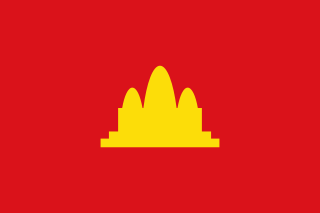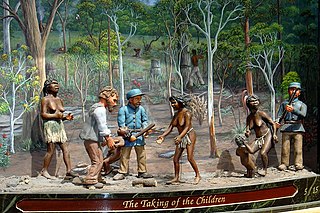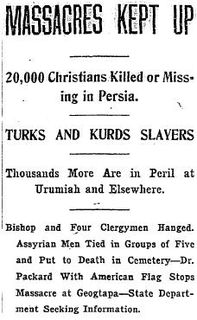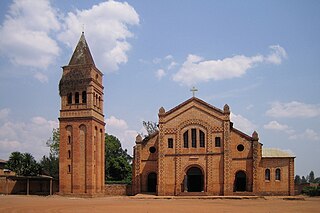Genocide is intentional action to destroy a people in whole or in part. The hybrid word "genocide" is a combination of the Greek word γένος and the Latin suffix -caedo. The United Nations Genocide Convention, which was established in 1948, defines genocide as "acts committed with intent to destroy, in whole or in part, a national, ethnic, racial or religious group".

The Khmer Rouge was the name popularly given to the followers of the Communist Party of Kampuchea (CPK) and by extension to the regime through which the CPK ruled in Cambodia between 1975 and 1979. The name had originally been used in the 1950s by Norodom Sihanouk as a blanket term for the Cambodian left.

The Stolen Generations were the children of Australian Aboriginal and Torres Strait Islander descent who were removed from their families by the Australian Federal and State government agencies and church missions, under acts of their respective parliaments. The removals of those referred to as "half-caste" children were conducted in the period between approximately 1905 and 1967, although in some places mixed-race children were still being taken into the 1970s.
Cultural genocide or cultural cleansing is a concept that lawyer Raphael Lemkin distinguished in 1944 as a component of genocide. The term was considered in the 2007 United Nations Declaration on the Rights of Indigenous Peoples and juxtaposed next to the term "ethnocide", but it was removed in the final document, and simply replaced with "genocide." The precise definition of "cultural genocide" remains unclear. Some ethnologists, such as Robert Jaulin, use the term "ethnocide" as a substitute for "cultural genocide", although this usage has been criticized as engendering a risk of confusing ethnicity with culture.
The Hutu, also known as the Abahutu, are a Bantu ethnic or social group native to the African Great Lakes region of Africa, primarily area now under Burundi and Rwanda. They mainly live in Rwanda, Burundi, and the eastern Democratic Republic of the Congo, where they form one of the principal population divisions alongside the Tutsi and the Twa.

The Armenian Genocide, also known as the Armenian Holocaust, was the Ottoman government's systematic extermination of 1.5 million Armenians, mostly citizens within the Ottoman Empire. The starting date is conventionally held to be 24 April 1915, the day that Ottoman authorities rounded up, arrested, and deported from Constantinople to the region of Ankara, 235 to 270 Armenian intellectuals and community leaders, the majority of whom were eventually murdered. The genocide was carried out during and after World War I and implemented in two phases—the wholesale killing of the able-bodied male population through massacre and subjection of army conscripts to forced labour, followed by the deportation of women, children, the elderly, and the infirm on death marches leading to the Syrian Desert. Driven forward by military escorts, the deportees were deprived of food and water and subjected to periodic robbery, rape, and massacre. Other ethnic groups were similarly targeted for extermination in the Assyrian genocide and the Greek genocide, and their treatment is considered by some historians to be part of the same genocidal policy. Most Armenian diaspora communities around the world came into being as a direct result of the genocide.
The Convention on the Prevention and Punishment of the Crime of Genocide was adopted by the United Nations General Assembly on 9 December 1948 as General Assembly Resolution 260. The Convention entered into force on 12 January 1951. It defines genocide in legal terms, and is the culmination of years of campaigning by lawyer Raphael Lemkin. All participating countries are advised to prevent and punish actions of genocide in war and in peacetime. As of December 2017, 149 states have ratified or acceded to the treaty, most recently Benin on 2 November 2017. One state, the Dominican Republic, has signed but not ratified the treaty.

The Rwandan genocide, also known as the genocide against the Tutsi, was a mass slaughter of Tutsi in Rwanda during the Rwandan Civil War, which had started in 1990. It was directed by members of the Hutu majority government during the 100-day period from 7 April to mid-July 1994. An estimated 500,000 to 1,000,000 Rwandans were killed, constituting an estimated 70% of the Tutsi population. Additionally, 30% of the Pygmy Batwa were killed. The genocide and widespread slaughter of Rwandans ended after the Tutsi-backed and heavily armed Rwandan Patriotic Front (RPF), led by Paul Kagame, took control of the capital, Kigali, and the country. An estimated 2,000,000 Rwandans, mostly Hutu, were displaced and became refugees.

Genocide is the deliberate and systematic destruction, in whole or in part, of an ethnic, racial, religious or national group. The term was coined in 1944 by Raphael Lemkin. It is defined in Article 2 of the Convention on the Prevention and Punishment of the Crime of Genocide (CPPCG) of 1948 as "any of the following acts committed with intent to destroy, in whole or in part, a national, ethnical, racial or religious group, as such: killing members of the group; causing serious bodily or mental harm to members of the group; deliberately inflicting on the groups conditions of life, calculated to bring about its physical destruction in whole or in part; imposing measures intended to prevent births within the group; [and] forcibly transferring children of the group to another group."

The Assyrian genocide refers to the mass slaughter of the Assyrian population of the Ottoman Empire and those in neighbouring Persia by Ottoman troops during the First World War, in conjunction with the Armenian and Greek genocides.

The term Bosnian genocide refers to either genocide at Srebrenica and Žepa committed by Bosnian Serb forces in 1995 or the wider ethnic cleansing campaign throughout areas controlled by the Army of Republika Srpska that took place during the 1992–1995 Bosnian War.
The history wars in Australia are an ongoing public debate over the interpretation of the history of the British colonisation of Australia and development of contemporary Australian society.

The Greek genocide, including the Pontic genocide, was the systematic killing of the Christian Ottoman Greek population carried out in Anatolia during World War I and its aftermath (1914–1922) on the basis of their religion and ethnicity. It was instigated by the government of the Ottoman Empire and the Turkish national movement against the indigenous Greek population of the Empire and it included massacres, forced deportations involving death marches, summary expulsions, arbitrary execution, and the destruction of Eastern Orthodox cultural, historical, and religious monuments. According to various sources, several hundred thousand Ottoman Greeks died during this period. Most of the refugees and survivors fled to Greece. Some, especially those in Eastern provinces, took refuge in the neighbouring Russian Empire.

Armenian Genocide denial is the act of denying the planned systematic genocide of 1.5 million Armenians during World War I, conducted by the Ottoman government. Turkey similarly denies the genocides perpetrated against indigenous Assyrians and Greeks during the same period. As form of denialism, it can be compared to similar negationist historical revisionisms such as Holocaust denial and Nanking Massacre denial.

Christianity is the largest religion in Rwanda. The most recent statistics on religion were published by the US Government in 2013, yet the source information dates back to the national Census of 2002, which reports that: 56.9% of the Rwanda's population is Roman Catholic, 26 % is Protestant, 11.1% is Seventh-day Adventist, 4.6% is Muslim, 1.7% claims no or other religious affiliation, and 0.1% practices traditional indigenous beliefs.
Armenian Uruguayans number around 15,000-19,000 of the population, making Uruguay to have one of the largest Armenian populations around the world. The Armenian community in Uruguay is one of the oldest communities in South America, with most of them residing in the capital Montevideo.
Holocaust studies is a scholarly discipline that encompasses the historical research and study of the Holocaust. Institutions dedicated to Holocaust research investigate the multidisciplinary and interdisciplinary aspects of Holocaust methodology, demography, sociology, and psychology. It also covers the study of Nazi Germany, World War II, Jewish history, religion, Christian-Jewish relations, Holocaust theology, ethics, social responsibility, and genocide on a global scale.Exploring trauma, memories, and testimonies of the experiences of Holocaust survivors, human rights, international relations, Jewish life, Judaism, and Jewish identity in the post-Holocaust world are also covered in this type of research.

"Face the Shadow" is a song performed by Armenian supergroup Genealogy. The song is composed by Armen Martirosyan and the lyrics are by Inna Mkrtchyan. The song represented Armenia in the Eurovision Song Contest 2015 on 23 May 2015, finishing 16th overall, with a total of 34 points from only 8 countries including a maximum 12 points from Georgia.
The effects of genocide on youth include psychological and demographic effects that affect the transition into adulthood. These effects are also seen in future generations of youth.











